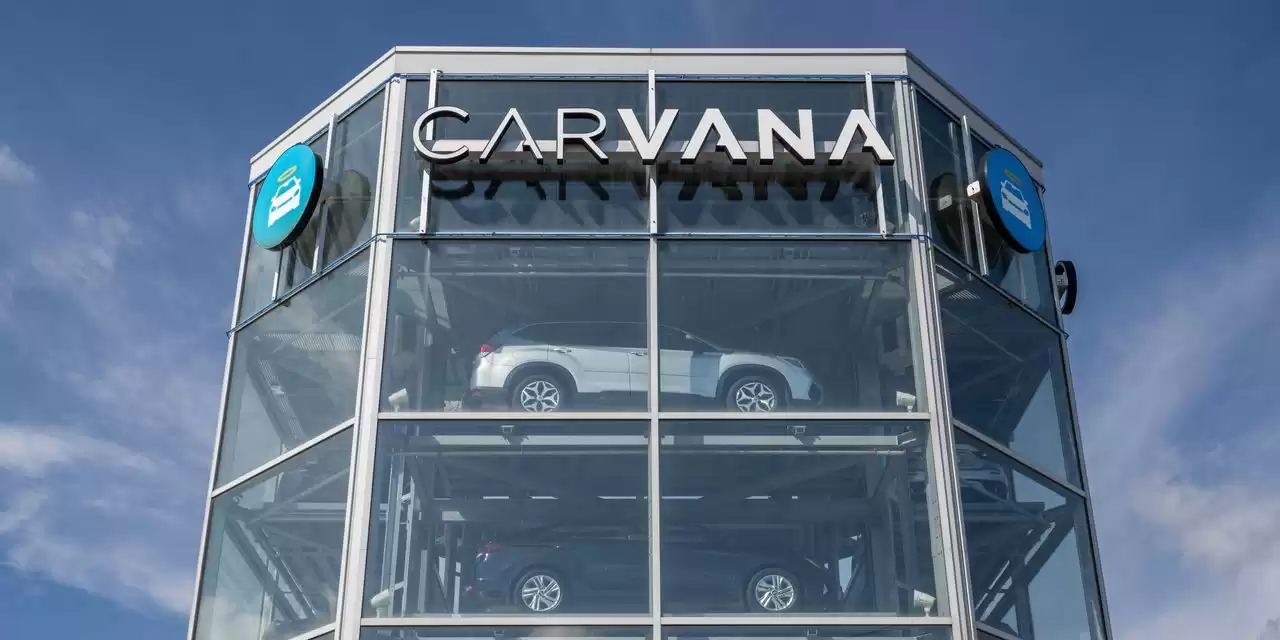Carvana's Stock Witnesses a 1,000% Surge: Potential for Short-lived Growth.
Shares of Carvana surge as online used car seller beats expectations.
Shares of Carvana have experienced a significant surge, catching the attention of investors. The online seller of used cars started the year with a stock price of less than $5, but it has now reached over $54. This raises questions about what is driving this growth and whether it is sustainable.
On Wednesday morning, Carvana (ticker: CVNA) shares were up 37% at $54.45, while the S&P 500 and Nasdaq Composite saw smaller gains of about 0.5% and 0.3% respectively.
One factor contributing to this positive trend is Carvana's improved financial performance. In the second quarter, the company reported a per-share loss of approximately $1.11, slightly better than the expected loss of $1.13. Additionally, Carvana exceeded expectations in terms of earnings before interest, taxes, depreciation, and amortization (EBITDA).
Analysts were pleasantly surprised when Carvana announced that its EBITDA for the second quarter would be over $50 million. The actual figure came in at $155 million, or $85 million after deducting $70 million in nonrecurring benefits. This exceeded initial expectations and was seen as a positive development by industry experts.
Another positive development for Carvana is the agreement it reached with its lenders to eliminate a significant portion of its debt due in 2025 and 2027. This provides the company with greater financial flexibility. However, it is important to note that Carvana is still operating at a loss and the long-term outlook remains relatively unchanged.
Analysts predict that Carvana's sales in 2024 will reach $11.9 billion, slightly lower than the previously anticipated $13.1 billion. This decline is attributed to lower used-car prices in the market and an expected decrease in the number of vehicles sold by Carvana. Analysts now estimate that the company will sell approximately 377,000 cars and trucks in 2024, compared to the previous estimate of 420,000.
While a decrease in sales volume may result in fewer losses for Carvana, the company is still experiencing significant cash outflow. It is projected that Carvana's free cash flow in 2024 will be negative $667 million, slightly higher than the previously expected negative $642 million.
Despite these positive developments, it is important to note that they do not fully explain the stock price gain of over 1,000%. The real driving force behind this surge is fear among short sellers. According to S3 Partners, a publisher of short-selling research and statistics, 47.8% of Carvana's available shares for trading have been sold short. This amounts to 40.4 million shares worth $1.6 billion, a significant figure for a company of Carvana's size.
When a heavily shorted stock shows signs of improvement, it often leads to a surge in prices as short sellers rush to cover their positions. This has resulted in substantial losses for short sellers, with Carvana shorts experiencing $1.54 billion in year-to-date mark-to-market losses in 2023.
Despite the significant increase in stock price, Carvana is still down approximately 86% from its record highs in 2021. While the stock may continue to rise, it is important to consider its valuation. Wall Street analysts expect Carvana to generate around $250 million in positive free cash flow in 2026, which would leave the stock trading at around 31 times that amount. In comparison, the S&P 500 trades at approximately 22 times estimated 2024 free cash flow.
Barron's expresses skepticism about the sustainability of Carvana's rally, citing the eventual covering of short positions and the overall financial outlook. However, it is worth noting that Carvana could still generate more cash sooner than expected.
In light of these factors, investors are advised to exercise caution when considering investments in Carvana.











Comments on Carvana's Stock Witnesses a 1,000% Surge: Potential for Short-lived Growth.